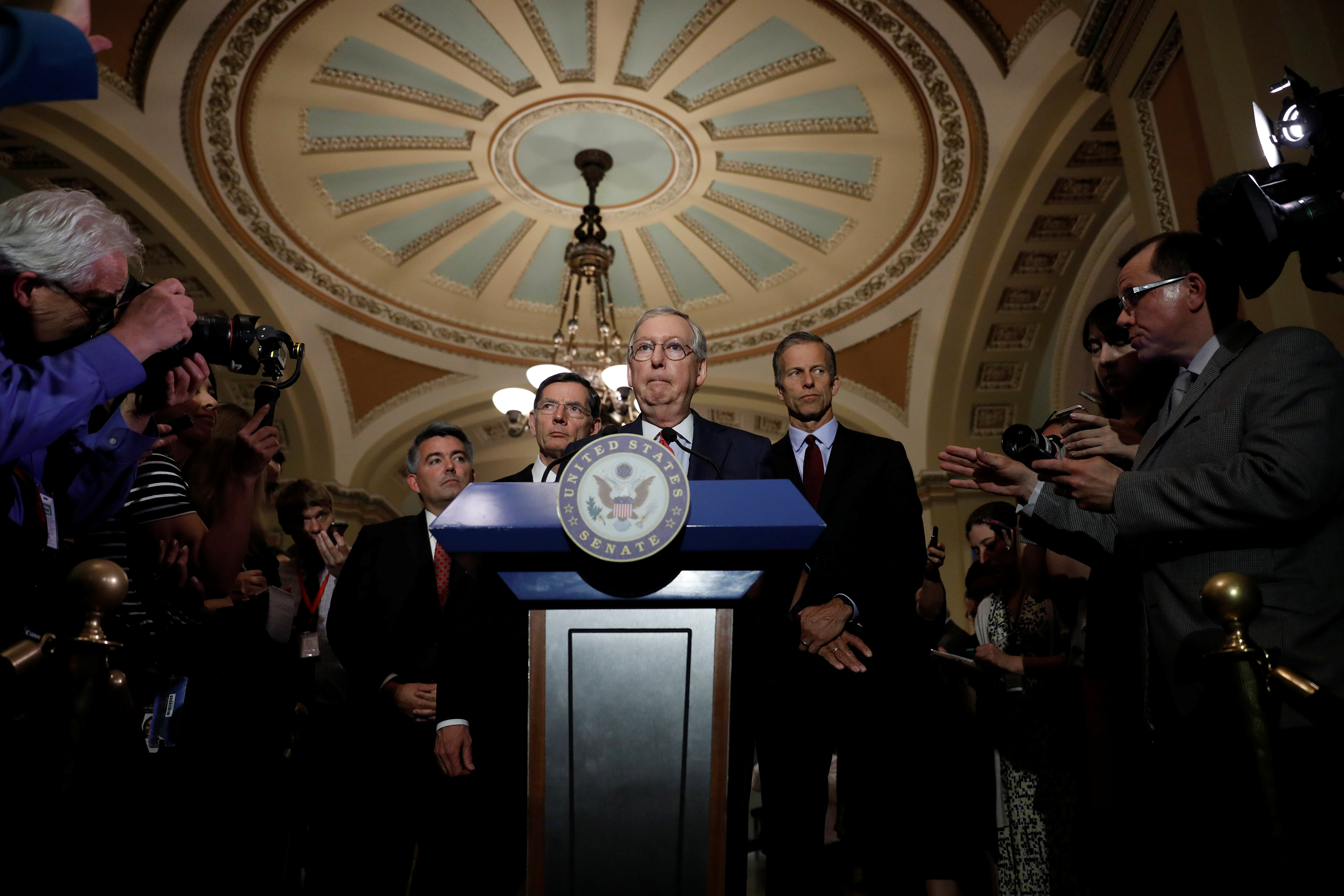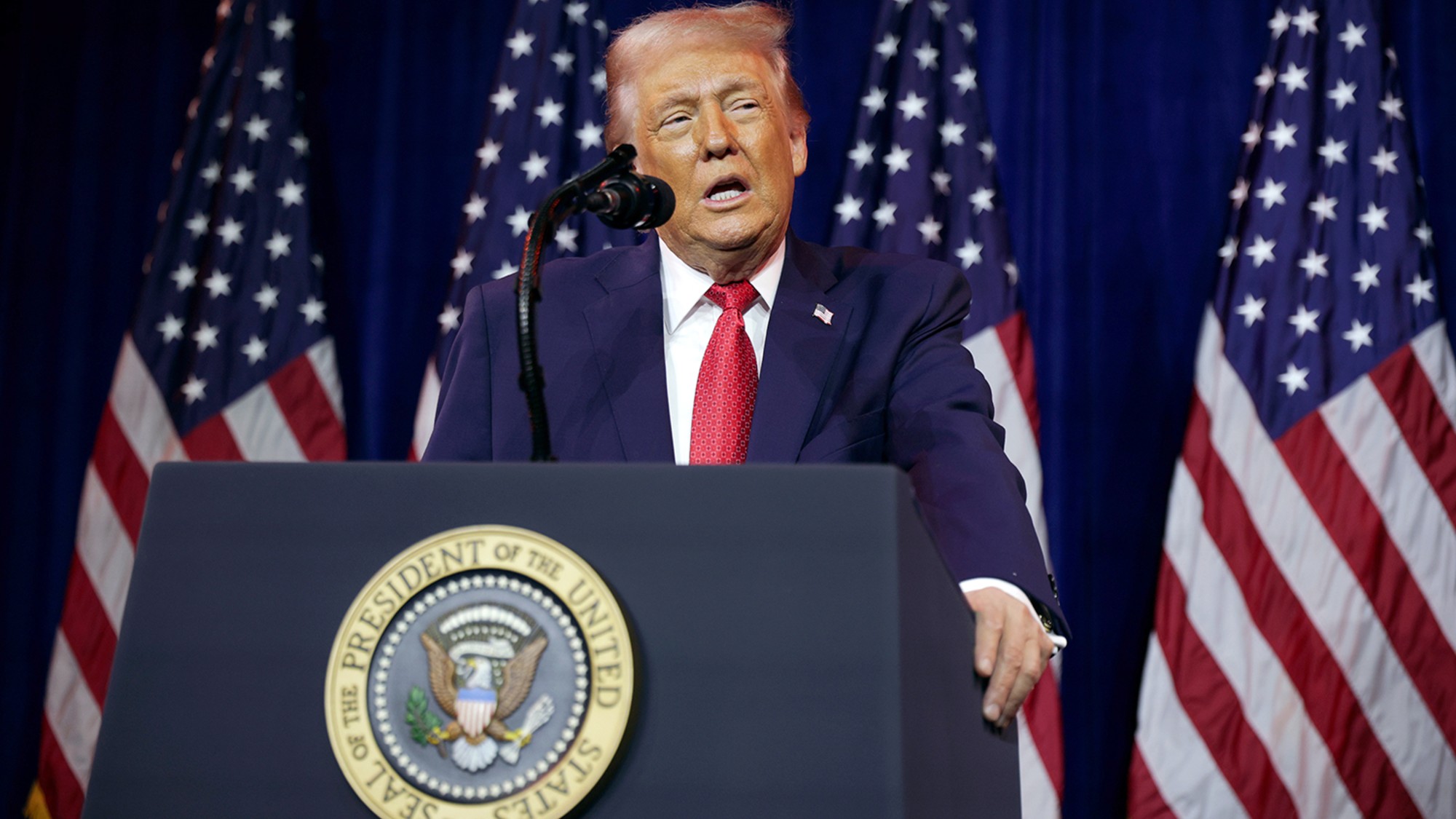The GOP's cartwheeling troupe of sycophants and hacks are lying their heads off about health care
The Republican health-care plan is indefensible on the merits. All they can do is lie about it.


Senate Republicans are struggling mightily to pass their version of TrumpCare. They had originally scheduled a vote for this week, but have pushed it back to after the July recess to give the leadership more time to shore up the party's wobbling right and left flanks.
Here's what TrumpCare does, in all its various manifestations: cut taxes on roughly the top 2 percent of families, and pay for it by slashing ObamaCare subsidies and Medicaid, throwing tens of millions off their health insurance. The motivation for such a bill can only be some combination of two things: the belief that wealthy people's incomes are too low, and the belief that government health insurance programs are too generous (or should not exist at all).
That argument is too brutal and unpopular for most people to face, so the Republican Party and its cartwheeling troupe of media sycophants and hacks have chosen lying, dissembling, and prevaricating to sell their monstrous legislation.
The Week
Escape your echo chamber. Get the facts behind the news, plus analysis from multiple perspectives.

Sign up for The Week's Free Newsletters
From our morning news briefing to a weekly Good News Newsletter, get the best of The Week delivered directly to your inbox.
From our morning news briefing to a weekly Good News Newsletter, get the best of The Week delivered directly to your inbox.
The most brazen deception comes from official Republicans like White House Press Secretary Sean Spicer, who flat out lies with an implication that TrumpCare is going to insure people left behind by ObamaCare:
HHS Secretary Tom Price has similarly claimed that nobody will lose their Medicaid. In reality, according to the Congressional Budget Office, the Senate version of TrumpCare will increase the number of people without insurance by 22 million by 2026 — seven million off the ObamaCare exchanges, and 15 million off Medicaid, with millions more off Medicaid after 2026.
Other conservative politicians, like Paul Ryan, have tried a version of the traditional conservative circular reasoning about markets and freedom. He casts the 22 million more uninsured people like this: "If you're not going to force people to buy ... something they don't want, they won't buy it. It's not that people are getting pushed off a plan, it's that people will choose not to buy something they don't like or want."
The first piece of deception here, as Jonathan Chait points out, is that most of the uninsured people will be straight kicked off Medicaid, not the private market. But this depiction of market choices is also reasoning in circles. People will become uninsured because they won't purchase insurance on the private market. How do we know that it is a free choice? Because they made a choice on the private market.
A free daily email with the biggest news stories of the day – and the best features from TheWeek.com
What Ryan is obscuring is that for those people, his party will have removed the option of affordable insurance coverage. Nobody actually wants to go uninsured. Republicans, by structuring the insurance market so as to remove any workable option for these people, are forcibly throwing people off their insurance, and covering up that fact by an utterly preposterous rhetorical sleight of hand.
Even the vaunted 20 percent premium reductions under TrumpCare turn out to be almost entirely a fallacy of composition. A Kaiser Family Foundation analysis found that for equivalent ObamaCare plans, virtually every person's premiums will go up under TrumpCare, some by nearly 300 percent, due to the much more stingy TrumpCare subsidies. That will in turn force some people into worse, cheaper coverage, and others out of the market altogether — thus the decrease in average premiums.
More subtle deception comes from analyst Avik Roy, who has been all over the op-ed pages with TrumpCare apologia. His strategy is mainly throwing up a lot of dust to sow confusion.
In one prong of attack, he all but accuses the CBO of cooking the books, saying they always come up with the same dire result of a bit over 20 million more uninsured no matter the details of the Republican bill. He somehow neglected to include this analysis of one 2016 Republican ObamaCare repeal, which the CBO predicted would cause 32 million to lose their coverage, until Josh Barro pointed it out to him on Twitter. Whoops!
Second, he makes one important assertion in the midst of a lot of free market puffery. He calls Medicaid "a program that researchers have shown has health outcomes no better than being uninsured." Since the bulk of the people losing their insurance under TrumpCare would be on Medicaid, this is a key claim to address.
It's important to note the single study of Medicaid expansion in a single state (Oregon) Roy is referencing actually found a substantial mental health benefit to Medicaid enrollment, as well as a large decrease in financial stress. It also did find a physical health benefit, just not a statistically significant one — which is not the same thing as affirmatively finding no benefit.
But before we tackle health, let's back up a bit. Epistemologically speaking, an insurance program like Medicaid having no positive health benefit at all would be an extraordinarily weird result. The point of medical care is to treat injury and illness, thus improving health. The point of insurance is to ensure access to care, which Medicaid undoubtedly does. It's not the best insurance, because its reimbursement rates are cheap and so providers are reluctant to take it. But it does provide some access to care, with very low cost sharing. Studies of Medicaid expansion have found substantial increases in primary care, as well as treatment of chronic conditions like diabetes, for instance. All that is no doubt part of why in one survey, 86 percent of Medicaid enrollees rate the experience as positive.
So it would be astounding if Medicaid provided no benefit at all — that the government was paying about $550 billion for medical treatment that did nothing. We should rightly expect a huge weight of evidence to support such an outlandish conclusion.
In fact, there is no such consensus. Several other studies have found at least some health benefit to Medicaid, and people have leveled serious methodological criticisms of the Oregon study. If anything, the weight of studies, compiled carefully by Ben Sommers, Atul Gawande, and Katherine Baicker (who was also the lead author on Roy's cherished Oregon study), suggests the opposite — that Medicaid does probably does produce "significant, multifaceted, and nuanced benefits to health," in addition to providing financial security and mental health benefits.
Notably, Roy has repeatedly refused to say whether or not he advised Senate Republicans on the bill.
So don't let this parade of nonsense and lies obscure the basic truth of TrumpCare: It's a tax cut bill, paid for by taking health insurance from millions of working-class and poor Americans. The outcomes on health will be disastrous.
Ryan Cooper is a national correspondent at TheWeek.com. His work has appeared in the Washington Monthly, The New Republic, and the Washington Post.
-
 Scoundrels, spies and squires in January TV
Scoundrels, spies and squires in January TVthe week recommends This month’s new releases include ‘The Pitt,’ ‘Industry,’ ‘Ponies’ and ‘A Knight of the Seven Kingdoms’
-
 Venezuela: The ‘Donroe doctrine’ takes shape
Venezuela: The ‘Donroe doctrine’ takes shapeFeature President Trump wants to impose “American dominance”
-
 Giving up the booze
Giving up the boozeFeature Sobriety is not good for the alcohol industry.
-
 The billionaires’ wealth tax: a catastrophe for California?
The billionaires’ wealth tax: a catastrophe for California?Talking Point Peter Thiel and Larry Page preparing to change state residency
-
 Bari Weiss’ ‘60 Minutes’ scandal is about more than one report
Bari Weiss’ ‘60 Minutes’ scandal is about more than one reportIN THE SPOTLIGHT By blocking an approved segment on a controversial prison holding US deportees in El Salvador, the editor-in-chief of CBS News has become the main story
-
 Has Zohran Mamdani shown the Democrats how to win again?
Has Zohran Mamdani shown the Democrats how to win again?Today’s Big Question New York City mayoral election touted as victory for left-wing populists but moderate centrist wins elsewhere present more complex path for Democratic Party
-
 Millions turn out for anti-Trump ‘No Kings’ rallies
Millions turn out for anti-Trump ‘No Kings’ ralliesSpeed Read An estimated 7 million people participated, 2 million more than at the first ‘No Kings’ protest in June
-
 Ghislaine Maxwell: angling for a Trump pardon
Ghislaine Maxwell: angling for a Trump pardonTalking Point Convicted sex trafficker's testimony could shed new light on president's links to Jeffrey Epstein
-
 The last words and final moments of 40 presidents
The last words and final moments of 40 presidentsThe Explainer Some are eloquent quotes worthy of the holders of the highest office in the nation, and others... aren't
-
 The JFK files: the truth at last?
The JFK files: the truth at last?In The Spotlight More than 64,000 previously classified documents relating the 1963 assassination of John F. Kennedy have been released by the Trump administration
-
 'Seriously, not literally': how should the world take Donald Trump?
'Seriously, not literally': how should the world take Donald Trump?Today's big question White House rhetoric and reality look likely to become increasingly blurred
